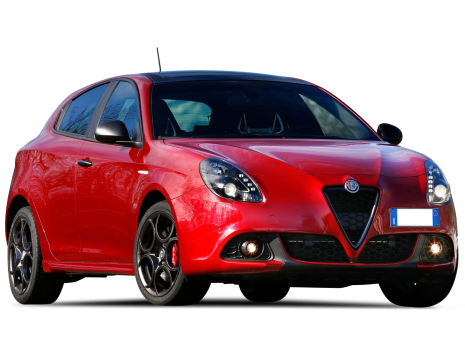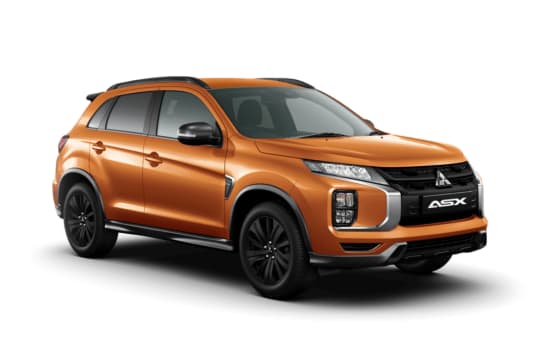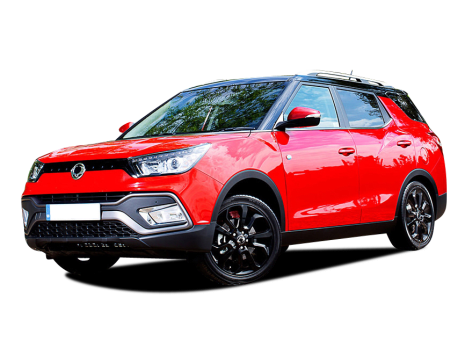
Volkswagen Golf VS Mahindra XUV500
Volkswagen Golf
Likes
- Superb engine
- Nice to drive, even around town
- Good space utilisation
Dislikes
- Too much road noise
- Annoying touchscreen
- Pricey
Mahindra XUV500
Likes
- Cheap way into seven seats
- Petrol/auto combination a winner
- Hugely spacious third row
Dislikes
- Underwhelming safety
- Steering that requires plenty of guesswork
- Cheap-feeling interior
Summary
Volkswagen Golf
In a world where hatchbacks are being cancelled left, right and centre, it was super refreshing to get into the Volkswagen Golf GTI hot-hatch recently.
I’d driven other Mk 8 Golf models including the R flagship wagon, but this was my go in the car I’d long considered to be the best Golf for the money.
But with prices continuously cruising north - this car is now a $54,990 prospect before on-road costs - does it still make dollars and sense? And what’s it like to live with in the daily grind?
| Safety rating | |
|---|---|
| Engine Type | 2.0L turbo |
| Fuel Type | — |
| Fuel Efficiency | 7L/100km |
| Seating | 5 seats |
Mahindra XUV500
Just in case attacking Australia's crowded SUV market with a virtually unheard of Indian brand wasn't a high enough hurdle to leap over, Mahindra had made its task even harder - think a Bollywood version of Mission Impossible - by launching its XUV500 SUV here with a diesel engine (which nobody wanted) and a manual gearbox (which few could even remember how to use).
Fortunately, it fixed one of those issues late in 2016, finally adding an automatic transmission to the line-up. And now, at long last, it's fixed the other.
This, then, is the petrol-powered XUV500 SUV. And, on paper at least, it's the most sense-making Mahindra to date.
For one, it's a ferociously cheap way into a new seven-seat SUV. For another, it's pretty well equipped, even from the base level. There's a long warranty, an equally long roadside assistance offering, and there's capped-price servicing, too.
So, should the mainstream SUV players be looking over their shoulders?
Spoiler alert: no.
| Safety rating | |
|---|---|
| Engine Type | 2.2L turbo |
| Fuel Type | Diesel |
| Fuel Efficiency | 6.7L/100km |
| Seating | 7 seats |
Verdict
Volkswagen Golf8/10
The Volkswagen Golf GTI is still a standard-setter when it comes to the “do it all” style of sporty hatch.
I wish the media screen was simpler, and that it wasn’t so loud inside on rougher road surfaces that are so common around Australia, and I wish it was cheaper, too.
But if you can justify the cost, and you want a five-door hatch with plenty of power and presence, then the Golf GTI could well be the go. But I’d also personally be checking out the Cupra Leon, which I think looks better and has a bit more individual appeal.
Mahindra XUV5006.5/10
This petrol-powered and well-priced XUV500 W6 might mark Mahindra's most convincing effort at cracking Australia's congested SUV market, but we're still not completely convinced.
That said, it's certainly cheap, the ownership credentials stack up and it's a very comfortable way to transport seven people.
Will this Mahindra's low price and upgraded spec win your SUV vote? Tell us in the comments below.
Design
Volkswagen Golf
You can tell it’s a GTI at a glance, and that means it’s off to a good start. There’s the telltale red grille strip, sitting proud above a very aggressive lower bumper with chequered-flag style daytime running lights.
In profile there’s a GTI badge on the front fender, and I think the 19s on this particular car sit a lot nicer than the ‘Richmond’ 18-inch rims on the standard car. There are red calipers, too, and tinted rear glass.
At the rear there is a minimalist approach to the badging - just the three important letters ‘GTI’ below the VW emblem, which doubles as the boot opening handle. The lower bumper features a pair of round exhaust tips, which poke out a bit more than you might expect.
The inside has the iconic - but not identical between generations - tartan seat trim, and I love it. Got a few really nice compliments on the design, which is called ‘Scale Paper’, in this gen and spec.
Otherwise, it’s a pared back affair, and you could be sitting in any other high-grade Golf.
Mahindra XUV5005/10
There's no getting away from the fact the XUV500 is not the sleekest, prettiest SUV in the pack. But it's not ugly, either. More that it looks like it's doing its best with a design philosophy hatched a generation or two ago.
Its best angle by far is when viewed straight on, where the piano-black grille, dual bonnet bulges and complicated (read: a little weird) headlight clusters all add some road presence to Mahindra's only SUV.
A side-on viewing, however, is less satisfying, where a combination of strangely placed and super-sharp body creases (including one over the rear wheelarch, which adds a Harbour Bridge-style crescent to the otherwise-straight window line) and serious rear overhang give the XUV500 an inescapable awkwardness.
Inside, expect a vast collection of rock-hard (though nicely patterned) plastics, with the ambiance rescued somewhat by the clean-looking and vertical central control unit, which is home to the media screen and air-con controls.
Ready for some hashtag real talk? There are better-looking and better-feeling seven-seat SUVs out there. But there aren't many that start at $25,990 drive-away. And I think that's Mahindra's point.
Practicality
Volkswagen Golf
You’ll fit more in the Golf hatch than you might expect. I took myself, my daughter and both my parents for a few-hour drive in it, and there were no complaints about comfort or space.
The 374-litre (VDA) boot space was large enough to fit the pram, a few shopping bags and a baby backpack, though for families with a baby or toddler, longer trips with more baggage might prove a squeeze. If you need more space and don’t have a child-seat in the back, you’ll get 1230L (VDA) with the back seat folded down. And there’s a space-saver spare under the floor.
The back seat is easily roomy enough for smaller adults and kids, and I could even slot in behind my own driving position (I’m 182cm/6’0” tall) with enough room. Three across will be a squishy, but it is possible.
There are dual ISOFIX and three top-tether points for kid seats, plus there’s a fold-down armrest with cup holders, big door pockets for a bottle or loose items, and a few pockets on the front seat-backs, too. There are USB-C ports (x2), and directional air-vents.
Up front you’ll find similar storage - cup holders between the seats, a pair of big cubbies in the doors, and additional holsters for a phone (with wireless charging) and 2x USB-C ports, a centre console bin, and reasonable glovebox.
The usability of the media system is not terrific. There are menus upon menus, and nothing as intuitive as it could be because so much of it is touchscreen-based. There are only a few hard buttons below, and then you still need to use the screen to get where you need.
I also think the much-criticised lack of knobs and buttons for volume and temperature control is an issue. There are controls below the screen, but they aren’t illuminated, and they aren’t always the most receptive.
I also didn’t love the haptic touch buttons on the steering wheel. I kept bumping buttons inadvertently when driving enthusiastically.
Mahindra XUV5007/10
Pretty damn practical, actually, regardless of whether you want to carry people or cargo. Carrying both at the same time, however, is tricky.
But let's start with people. There is a huge amount of room in the third row of the XUV500, a space with enough head and legroom to put plenty of its competition to shame.
Thanks to second-row seat backs that fold flat, before the the entire seat lifts up and pushes forward, climbing into seats six and seven isn't too big a drama, either.
We rarely say this about seven-seat cars, but at 175cm, I'd feel plenty comfortable back there on a longer drive. There are two air vents in the third row, too, along with bottle storage and side-seat storage for thin items.
The space in the middle row is ample as well, and you'll find three ISOFIX attachment points, one for each of the three seats. There's also a door pocket in each rear door and storage nets on the rear of the two front seats. A pull-down divider that separates the back seat is home to two cupholders, matching the two for front seat riders.
The only downside to all this people-lugging happiness is that, with the third row of seats in place, there is absolutely no room for luggage. Mahindra doesn't quote a litre storage figure when seven are seated (mostly because it would probably be embarrassing to write "one litre"), but trust us, you'll be lucky to squeeze a soft backpack in the boot with all seats in place.
Things improve considerably when you drop the third row of seats, though, which unlocks 702 litres of storage, and that number climbs to 1512 litres with the second and third row folded down.
Price and features
Volkswagen Golf
As I mentioned, the 2023 VW Golf GTI lists at $54,990 (all prices listed are MSRP, or before on-road costs). So, on the road, you’re up over sixty grand. That used to be more than enough for a Golf R, but times they are a-changin.
And don’t go thinking you’re getting 15-inch touchscreens and leather trim for that money, either. The Golf GTI runs the iconic tartan cloth trim as standard, has the typical exterior styling treatment with red highlights, and it has LED headlights, keyless entry and push-button start, electric heated folding side mirrors, standard-fit 18-inch alloys and adaptive chassis control dampers.
Inside you’ll find a 10.0-inch touchscreen with sat nav, digital radio, wireless Apple CarPlay and Android Auto, a six-speaker stereo, wireless phone charging, auto-dimming rearview mirror, a digital instrument cluster, front, side and rear parking sensors with auto-parking, sports front seats with manual adjustment, leather-wrapped steering wheel,
The car I drove had the $2500 Sound and Style pack, which adds 19-inch wheels and Hankook Ventus S1 Evo3 (235/35/19) tyres as well as a Harman Kardon stereo with subwoofer, plus a head-up display.
If you want leather trim, you’ll have to option the Luxury Package ($3900) which adds Vienna leather upholstery, a panoramic sunroof, heated front seats, electric driver’s seat adjustment and electric driver’s lumbar adjustment, too.
Colour options include the no-cost Pure White and Moonstone Grey, Atlantic Blue metallic, Dolphin Grey metallic, and Deep Black pearl. Only the eye-catching Kings Red metallic costs $300 more.
Rivals for the VW Golf GTI include the Hyundai i30 N (from $46,200 for the manual; $49,200 for the dual-clutch auto), Renault Megane RS Trophy (from $62,300) and the mechanically related Cupra Leon VZ (from $52,990).
Mahindra XUV5009/10
Make no mistake, this Mahindra kills the competition on price. The entry-level W6 version will cost you a lean $25,990, while the fruited-up W8 version will set you back $29,990. You can even have an AWD W8 for $32,990. The best part? All of those are drive-away prices.
Go for the W6, and you can expect 17-inch alloy wheels, cloth seats, air-con with vents (powered by a second compressor) in the second and third row, cornering headlights with DRLs, front and rear fog lights, cruise control, rear parking sensors and a 6.0-inch multimedia screen linked with a six-speaker stereo.
Spring for the W8, and you'll add leather seats, a reversing camera, tyre-pressure monitoring and a bigger, 7.0-inch screen with standard sat-nav.
Under the bonnet
Volkswagen Golf
You know the VW Golf GTI formula. Punchy engine, front-wheel drive.
In this iteration, the engine is a 2.0-litre four-cylinder turbo-petrol with 180kW of power (from 5000-6200rpm) and 370Nm of torque (from 1600-4300rpm).
This generation doesn’t come with the option of a six-speed manual transmission like GTI models before it - instead, you get a seven-speed dual-clutch automatic transmission as standard.
The 0-100km/h claim is 6.4 seconds. But in some situations it feels faster than that.
Mahindra XUV5006/10
There's a diesel engine currently available, but the clock is ticking - Mahindra expects it to be phased out within six months. But the big news here is the new petrol engine, a turbocharged 2.2-litre unit good for 103kW/320Nm. It's paired exclusively with an Aisin-developed six-speed automatic transmission, and will send it's power to the front or all four wheels.
Mahindra doesn't quote official performance figures, but those engine outputs hardly scream excitement, do they?
Efficiency
Volkswagen Golf
The official combined cycle fuel consumption figure is 7.0 litres per 100 kilometres. That’s what you should be able to achieve across a mix of driving.
During my time in the Golf GTI, I did a few hundred kilometres of mixed driving, and saw a real-world return of 8.1L/100km. Respectable, I think. Undoubtedly it would be higher if all you do is drive hard - but this test was about how usable the car is in normal life.
It has a 50-litre fuel tank that needs to be filled with 95RON premium unleaded at a minimum.
Mahindra XUV5006/10
Local numbers are yet to be confirmed, but after an admittedly vigorous local test, the on-board computers was reading 13+ litres per 100km. All XUV500's are fitted with a 70-litre fuel tank.
Driving
Volkswagen Golf
This was an urban test first and foremost, and the Golf GTI still is one of the most liveable sporty hatchbacks on the market.
There are things you will need to contend with - the amount of coarse-chip road road that intrudes into the cabin is downright nasty at times, and even in the most comfortable drive mode it’s quite firm over Sydney’s pockmarked city roads - but otherwise, this thing is great.
The steering has heaps of weight to it, and is super direct. The heftiness of it might take some getting used to, especially when negotiating tight parking spaces, but there’s always the auto-parking function if you’re nervous.
Now, the adaptive chassis control dampers will be stiffer or softer depending on the drive mode you choose. There are Eco, Comfort, Sport and the configurable Individual setting, and when my family was on board I had the car in Comfort mode. Again, no complaints about ride comfort.
In Sport mode, it is sharper and lumpier, but never lacking in control or refinement. Yes, you do feel sharp edges, and it might be too edgy for full-time use, but it really does help the car feel more confident and planted.
The engine is terrific. It has more than enough grunt to make easy work of daily duties, and you needn’t fear about whether you’ll have enough squirt to make it for overtaking moves. It has an abundance of torque and the linear way in which it builds power from low in the rev range is superb.
I also had no complaints about the dual-clutch auto transmission. The action of it can take some getting used to at lower speeds, where it can feel like it’s slurring a bit, but it really is a super gearbox, with snappy shifts at speed and smooth changes when you want them.
Mahindra XUV5006/10
About as old school as rocking a pair of button-up tracksuit pants with a Run-DMC cassette stuffed into your Walkman.
On a straight and unchallenging road, there's stuff to like about the petrol-powered XUV500. The engine, while gruff under heavy acceleration, doesn't feel too wheezy when you're not asking a great deal of it, and nor is the cabin overly loud at suburban speeds. It's a comfortable space for driver and passengers, too, and the gearbox performed seamlessly on our short test drive.
But that's about where the good news ends. There's an unshakeable agricultural feel to the way this Mahindra SUV goes about its business, and nowhere is that more obvious than through the steering wheel, which has only a vague and difficult relationship with the the front tyres, making it seriously tricky to approach twisting roads with anything approaching confidence.
The steering is slow and cumbersome - light when you first begin turning the wheel, with a ton of weight appearing by surprise midway through the cornering process - and it has a tendency to fight back should the front wheels find a bump or corrugation in the road, too.
The body lolls about when challenged, too, and the tyres are quick to give up their grip on tighter corners. All of which would give it a certain retro charm if it wasn't so very new, and I must admit I was cackling maniacally on some of the more twisting roads.
But it's simply not a car I could live with.
Safety
Volkswagen Golf
The Golf 8 range scored a maximum five-star ANCAP crash test rating in 2019. Standards have changed a bit since then, but it still has plenty of standard active safety tech.
The list includes forward AEB with pedestrian and cyclist detection, plus it has blind-spot monitoring, rear cross-traffic alert, reversing collision avoidance, lane keeping support, adaptive cruise control, a reversing camera and front and rear parking sensors.
If you’re waiting for a new VW Golf GTI, the brand has confirmed that from November production, the R-Line, GTI and R models pick up a front centre airbag. That’ll make the tally seven airbags, with dual front, front side and full-length curtains fitted to all earlier and future models.
Mahindra XUV5006/10
Expect dual front, front-side and curtain airbags (though the latter don't extend to the third row of seats), along with rear parking sensors and ESP. Stepping up to the W8 trim adds a reversing camera with dynamic guidelines. The XUV500 was awarded a four-star (out of five) ANCAP assessment when tested in 2012.
Ownership
Volkswagen Golf
Buying a VW? You’ll score a five-year/unlimited kilometre warranty. That’s good, but not as good as Skoda, MG, GWM Haval or Kia. But none of those brands have a real hot-hatch like this.
Servicing is every 12 months/15,000km. There’s a capped-price plan or “Care Plan” prepay packs for three years/45,000km ($1600) or five years/75,000km ($2800). Choose the latter and you’re saving heaps over pay-as-you-go ($786, to be precise).
You get a year of roadside assistance included, but that renews each time you service your car with VW.
Mahindra XUV5007/10
All XUV500s are covered by a five year/100,000km warranty (though the final two years apply only to the drivetrain), along with five years of complimentary roadside assistance.
The XUV500 is also covered by Mahindra's capped-price servicing program for the first three years of ownership, and will require servicing every six months or 10,000km.















































































































